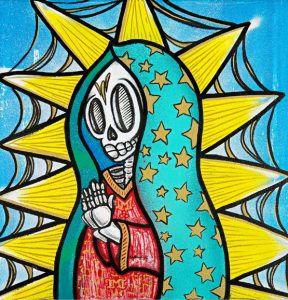La Guadalupana: An icon for Mexican Catholics

Two generations of Mexican Catholics in San Diego will celebrate one of Mexico’s most iconic images in two very different events: La Guada-lupana, or Lady of Guadalupe.
Two events, two views of the same icon, two groups honoring to what many consider to be the Mother of God, although the figure is cause of controversy among non-Catholic Mexicans.
The Confederación Guadalupana from the Diocese of San Diego will host its 49th Guadalupana Procession and Mass on Sunday, Dec. 7th. The procession will leave San Diego City College at 11 a.m., and the mass celebrated by Bishop Gilberto Chavez will be held at Golden Hall, Downtown, at 2 p.m.
“Our procession is a great tradition,” said Maria Felix, president of the Confederación Guadalupana. “There’s great devotion among all Mexican Catholics for her. She appeared in Mexico at a time when she was needed, when the Spaniards were enslaving the Indigenous people.”
Felix said that Mexican Catholics see La Guadalupana as “an adoptive mother that intercedes for us in front of Jesus.”
Regarding the criticism that Catholicism receives from Christians that argue that Catholics have turned Mary, the earthly mother of Jesus Christ, into a goddess, Felix said that this is not true.
“We know there’s only one God, and that only Jesus Christ is God,” she said. “But Mary prays for us, she asks her son for His favor.”
Felix said that the Confederación Guadalupana expects around 1,000 people.
The second event taking place honoring La Guadalupana is, as a matter of fact, plainly named La Guadalupana, an art exhibition happening on Friday, Dec. 12th, at Border X Brewer in Barrio Logan, where as many as 30 art pieces from well-known Chicano artists in San Diego, including Victor Ochoa, Carmen Kalo, and Mario Chacon.
For MEX, one of the artists organizing the event along with La Chica Boutique, La Guada-lupana represents Mexican and Chicano culture.
We’re bringing “Mexican and Chicano communities together united as one through art,” MEX said. “La Guadalupana is part of our roots and rich history. There are some people that would not take a look at art but when you paint such and iconic figure it makes some people stop and look at something they might not have taken the time to see. We’re taking the Chicano art to another level, making friends and strong family bonds.”
David Favela, president of Border X Brewer, said that the brewery is a space open to community artists who want to highlight positive aspects of Mexican and Chicano culture.
“This show in particular is a unique and beautiful combination of art and culture,” he said.
The promotional piece for the exhibition features La Guadalupana as a Día de los Muertos calaca. MEX accepts that portrayals as this might offend some people.
“It might be seen a sacrilegious or disrespectful to some,” he said. “But others can see that this is our art, this is what we love, and this is our way to show love and respect. This is 2014 and is time for the awakening.”
But Felix, from the Confederación Guadalupana, prefers to keep it traditional, and to honor La Guadalupana in its original image.
“For some people to paint La Guadalupana in such a way can be plain ignorance because they don’t know the true meaning bahind her,” she said. “They don’t know the theology; they are not well prepared as Catholics. It might as well be a lack of respect.”
MEX, on the other hand, said artists have a unique vision of looking at traditional culture, and this also applies to La Guadalupana.
“To some people what some of the Chicano artist are doing and how they are portraying her might seem offensive but it is our vision and who she has become to us,” he said. “She is a light that gives us hope. La Guadalupana is a spiritual guide. When we are lost or in need we ask her to pray for us.”
The celebration of the apparition of La Guadalupana goes back to December 12, 1531, when, according to Catholic tradition, she appeared before a Mexican Indigenous man named Juan Diego. The image of La Guadalupana played an important role in the evangelization of indigenous peoples in the Americas but has started to be questioned in recent decades when more and more Mexicans are leaving Catholicism in large numbers to become plain Christians.
For more information on the procession and mass, please contact the Confederación Guadalupana at (619) 729-1703. For more information on the La Guadalupana art exhibition, please visit www.borderxbrewing.com.






